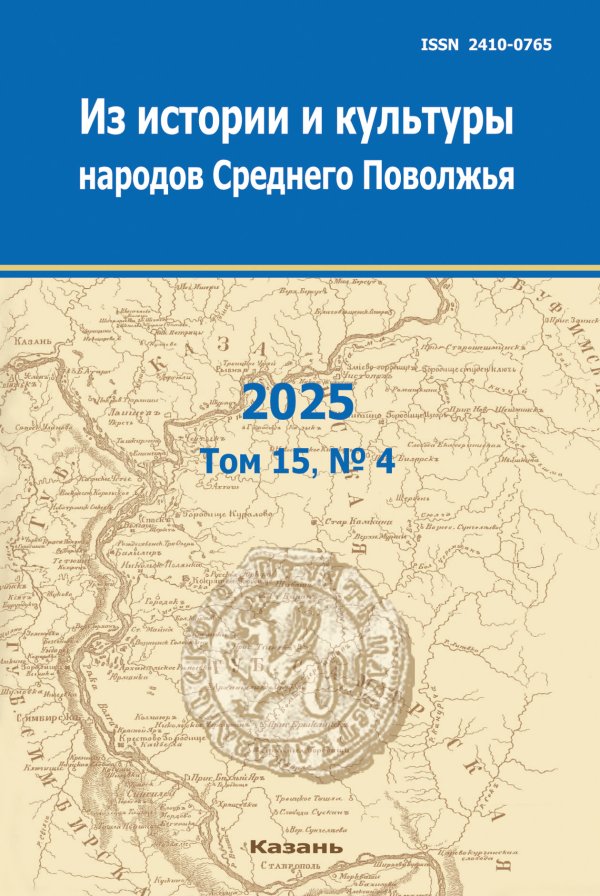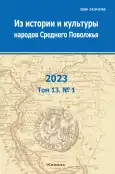Том 13, № 1 (2023)
- Год: 2023
- Выпуск опубликован: 04.04.2023
- Статей: 19
- URL: https://bakhtiniada.ru/2410-0765/issue/view/22514
Весь выпуск
Статьи
История высшего педагогического образования в Советской России как предмет исследования (вместо предисловия)
Аннотация
В работе обозначены основные историографические тенденции в области изучения истории высшего педагогического образования в Советской России, а также предложен обзор статей, представленных исследователями различных регионов РФ по итогам Всероссийской научной конференции «Исторический опыт подготовки педагогических кадров в Советской России», приуроченной к 100-летию Восточного педагогического института.
 12-22
12-22


Ресурсы тюркско-татарского дискурса образовательного пространства Поволжья. Конец XIX в. – 1930-е гг.
Аннотация
С конца XIX века ресурс тюркско-татарского дискурса в российском образовательном пространстве требовал адекватного восприятия и оценки перспектив развития. На пути его специализации в практической сфере виделся ряд проблем. Россия существенно отставала в вовлечении нерусского населения в образовательные практики государственной системы образования. Политическая практика формировать общее для всего населения образовательное пространство диссонировала с традиционными учебными институциями и их практиками, хотя среди тех имелись и сторонники реформ. Обе стороны: и имперский центр, и реформаторы традиционных школ, – понимали модернизацию и как обновление на старой основе, и как процесс, организуемый и решаемый. Цели, видимые по-разному каждой стороной, обусловили характер борьбы – жесткий и многообразный. Стороны занимали активную позицию. Значительная часть населения сохраняла институты и ресурсы своей культуры, претендуя на разную степень политической и правовой самодеятельности. Требования этнических коллективов об организации их жизни в новых условиях формировали политическое поле конкуренции и борьбы, не стесняясь апеллировать как к общегосударственным нуждам, так и к этническому чувству, их комплексу неурегулированных перспектив этнических культур.
 23-40
23-40


Провинциальные учителя дореформенной эпохи (на примере города Мензелинска Оренбургской губернии)
Аннотация
В статье рассматривается становление школьной системы в Мензелинске и кадровый состав первого учебного заведения уездного города – Мензелинского уездного училища в первой половине XIX в. На основе архивных данных реконструируется трудовая биография учителей, приводятся данные об их происхождении, профессиональной подготовке, а также внешкольной деятельности. Автор приходит к выводу о том, что учителя играли важную социокультурную роль в жизни города.
 41-51
41-51


Исторический факультет Казанского государственного педагогического института / университета (1934–2011): тенденции становления, развития и взаимосвязи с вузами России
Аннотация
Характеризуется становление и развитие исторического факультета в Казанском государственном педагогическом институте, который был создан в 1934 году одновременно с восстановлением исторических факультетов в Московском государственном университете и Ленинградском государственном университете. Создание истфака в Казанском государственном педагогическом институте, а также восстановление исторического факультета в Казанском государственном университете, обосновываются сохранением подготовки учителей истории в Восточно-педагогическом институте в 1920-е гг., когда все исторические факультеты в стране были преобразованы в факультеты общественных наук. Прослеживаются этапы исторического образования в КГПИ-КГПУ-ТГГПУ, формирование и деятельность научно-педагогического состава исторических кафедр факультета, связи с вузами России.
 52-62
52-62


Восточный педагогический институт в структуре высшего образования Казани в 1920-е гг.
Аннотация
В статье исследованы основные особенности организации высшего педагогического образования в Казани в первое десятилетие советской власти. Автор рассматривает положение Восточного педагогического института в структуре высшего образования города, особенности формирования кадрового состава, взаимоотношения коллектива вуза с органами власти различных уровней, структурные изменения, происходившие в институте в рассматриваемый период.
 63-78
63-78


Педагогическое образование в Казани в 1920–1930-е гг. и деятельность С.П. и Д.П. Шестаковых
Аннотация
В статье рассматривается развитие педагогического образования в 1920–1930-е годы на примере исторического образования. В этот период историческое образование было сосредоточено в Восточном педагогическом институте, где существовали две кафедры русской истории и всеобщей истории. Первоначальный учебный план был схож с таковым на историческом факультете Казанского университета, однако в дальнейшем он перерабатывался в соответствии с новыми веяниями в преподавании исторических и обществоведческих дисциплин. Издание указа «О преподавании гражданской истории в школах СССР» Совнаркома и ЦК ВКП (б) от 26 мая 1934 г. в ВПИ ознаменовало возвращение к конкретной истории в систематическом изложении и хронологической последовательности, что привело к новой перестройке исторического образования. Все эти перипетии повлияли и на развитие исторической науки в стране в целом: изменилась тематика исследований, снизилась их интенсивность, многие труды так и не вышли в свет. В этом плане представляет интерес деятельность казанских профессоров С.П. и Д.П. Шестаковых. С.П. Шестаков в этот период пытался сохранить историческое образование в Казани, активно участвуя в обсуждении реформ, а также предлагая новые курсы в связи с установление марксистской методологии. Он достаточно активно публикуется в этот период, участвует в работе Академии Наук. Д.П. Шестаков более негативно воспринял происходящие перемены и большее внимание уделял творческой деятельности (он был поэтом), хотя продолжал заниматься преподаванием.
 79-90
79-90


Чувашское отделение Восточного педагогического института (по материалам рукописного фонда Н.В. Никольского)
Аннотация
В статье проанализирована деятельность чувашского отделения Восточного педагогического института в 1926–1930 гг. Источниками статьи явились материалы Рукописного фонда профессора Н.В. Никольского в Научном архиве Чувашского государственного института гуманитарных наук. Отчеты, протоколы, отзывы, переписка и другие документы раскрывают роль Н.В. Никольского, Н.И. Ашмарина, Г.И. Комиссарова, В.Е. Егорова в развитии высшего образования в Чувашской АССР. Особо отмечена научно-исследовательская деятельность в чувашском отделении.
 91-110
91-110


Социально-экономическое положение студенчества Восточного педагогического института в 1920-е гг.
Аннотация
В статье исследуется социально-экономическое положение студенчества на примере Восточного Педагогического института в 1920-е гг. Обращается внимание на жилищную проблему и способы её решения, а также на основные вопросы, касающиеся социального обеспечения студентов: условия получения стипендии, льготного проезда, медицинского сопровождения. Особое внимание уделяется работе благотворительной организации «Европейская студенческая помощь», действовавшей от имени известного путешественника и филантропа Ф.Нансена.
 111-122
111-122


Принципы формирования научно-педагогических кадров в 1920-е гг. (на примере вузов Саратова)
Аннотация
В статье рассматриваются тенденции формирования научно-педагогических кадров для советской высшей школы в 1920-е гг. Выявлены основные факторы, которые влияли на показатели количественного и качественного состава научно-педагогического сообщества саратовских вузов в рассматриваемое десятилетие. На основе архивного материала анализируется состав научной корпорации по партийной принадлежности. Рассмотрена деятельность органов власти по созданию новой категории ученых из числа рабочих и крестьян, характеризуется система аспирантской подготовки и института выдвиженчества.
 123-132
123-132


Региональная система подготовки учительских кадров в Приенисейской Сибири в 1920–1930-е гг.
Аннотация
В статье на региональном материале раскрывается процесс формирования системы подготовки педагогических кадров. Особое внимание уделено особенностям реализации государственной политики по массовой подготовке учительских кадров после окончания Гражданской войны и в период введения начального всеобуча. На основе источников личного происхождения реконструируется учебно-воспитательный процесс в учительском институте, обладавшем значительной самостоятельностью. Анализируются причины, не позволившие в полной мере обеспечить региональную систему образования учительскими кадрами.
 133-139
133-139


Подготовка педагогических кадров для системы дошкольного образования в Тамбовском крае в 1920–1930-е гг.
Аннотация
Одной из центральных проблем становления и развития системы дошкольного образования была острая нехватка педагогических кадров в стране в целом и на местах. В статье рассматривается вопрос подготовки педагогических кадров для дошкольных учреждений в Тамбовском крае в 20–30-е гг. XX в., деятельность губернских, уездных дошкольных подотделов в этом направлении: организация курсовой и кружковой работы, наличие специализированных учебных заведений по подготовке специалистов по дошкольному воспитанию, примерные программы обучения. Показана прямая зависимость изменений в направлении подготовки педагогических кадров для системы дошкольного воспитания и образования региона от изменения политической ситуации в стране, от решений Всероссийских Съездов по дошкольному воспитанию.
 140-150
140-150


Деятельность Карельского государственного педагогического института в 1930-е гг.
Аннотация
В статье проанализирована организационная, учебная и научная деятельность Карельского государственного педагогического института в условиях сталинской модернизации 1930-х гг. Выявлены источники формирования, численность, состав таких новых социальных групп городского населения Карелии как преподаватели и студенты вузов. Доказано, что деятельность вузов Карелии существенно повысила в 1930-е гг. доступность высшего образования для сельской молодежи, представителей финно-угорских народов.
 151-155
151-155


Подготовка высших педагогических кадров в Советской Бурятии
Аннотация
В статье рассматриваются вопросы подготовки педагогических кадров Бурятии в советское время. Особое внимание в организации этого процесса уделяется опыту Бурятского государственного пединститута. Изучение деятельности БГПИ представляется важной составляющей в вопросе подготовки педагогов с высшим образованием. Цель исследования – изучение вклада БГПИ в дело подготовки учительских кадров с 1932 по 1991 гг. Представлены следующие задачи исследования: определение предпосылок создания пединститута; изучение основных этапов становления пединститута; выявление наиболее значимых выпускников института, занятых в региональной системе образования. За изучаемый период пединститут выпустил целую плеяду талантливых и выдающихся учителей, многое сделавших для развития образовательной системы Бурятии.
 156-163
156-163


Учебная повседневность студентов Елабужского учительского института в 1939–1941 гг.
Аннотация
Статья посвящена изучению учебной повседневности студентов Елабужского учительского института в период становления системы высшего педагогического образования в СССР. Согласно Постановления СНК РСФСР в 1939 г. 48 педагогических училищ были преобразованы в учительские институты. За несколько лет в стране была создана широкая сеть таких институтов. Постановлением Правительства Союза ССР в Елабуге к началу 1939–40 учебного года на базе педагогического училища был создан Учительский институт республиканского значения. Исследование проведено на примере Елабужского учительского института на основе анализа архивных источников и материалов периодической печати.
В исследовании проанализированы основные структурные компоненты учебной повседневности студентов учительского института: темпоральные характеристики, связанные с учебной деятельностью; организация учебно-воспитательного процесса в вузе; соблюдение общепринятых норм и правил поведения обучающихся, приемы проведения досуга и отдыха, культура питания и быта. Изучены жилищно-бытовые и материально-финансовые условия жизни студенческой молодёжи в условиях советской действительности в предвоенный период.
 164-175
164-175


Высшее и среднее специальное педагогическое образование в Свердловске накануне Великой Отечественной войны
Аннотация
В статье анализируются особенности подготовки учительских кадров в предвоенные годы на примере деятельности высших и средних специальных педагогических учреждений Свердловска в 1939 – первой половине 1941 гг. Делается вывод о том, что накануне фашистского нашествия в ходе начавшейся Второй мировой войны государство стремилось максимально расширить подготовку учителей. В конце 1930-х – начале 1941 гг. значительно увеличилось финансирование педвузов и педучилищ. Показаны изменения в составе педагогических учебных заведений Свердловска: наряду с существовавшим ранее Свердловским пединститутом появился учительский институт иностранных языков, произошло объединение русского и татаро-башкирского педтехникумов в единое педагогическое училище им. А.М. Горького. Изменилась система военной подготовки студентов и учащихся. В статье показано, что начиная с 1939 г. значительно снизилось по сравнению с 1937 – 1938 гг. влияние политических репрессий на общественную жизнь, в том числе в сфере народного образования, хотя беззакония властных структур продолжались. Об этом свидетельствуют судьбы руководителей педагогических учебных заведений Свердловска. Анализируются новые направления государственной политики по отношению к образовательным учреждениям, в том числе педагогическим, во многом связанные с введением в 1940 г. платности в образовании: борьба партийно-советского руководства с «либерализмом» и «процентоманией» со стороны чиновников и преподавателей, изменения в порядке выплаты стипендий и организации учебного процесса в вузах и педтехникумах.
 176-185
176-185


От учительского института к педагогическому: исторический опыт подготовки педагогов в Елабуге в начале 1950-х годов
Аннотация
В статье раскрывается один из этапов развития педагогического образования в Елабужском институте (филиале) КФУ. На основе архивных материалов автор анализирует реорганизацию Елабужского Учительского института в Елабужский государственный педагогический институт в 1953 г. Источники позволяют выявить преподавательский состав, уровень и качество обучения в вузе, охарактеризовать культурно-образовательное пространство института. Проведённый источниковедческий анализ даёт возможность показать, какие требования Министерство просвещения РСФСР предъявляло к качеству подготовки советских педагогических кадров, каким был статус профессорско-преподавательского состава Елабужского института, уровень материально-технической обеспеченности вузов, какую финансовую поддержку от государства получали студенты, как оценивался труд педагогических работников, как была представлена повседневная жизнь преподавателей и студентов.
 186-191
186-191


Публикация источника
Список окончивших курс воспитанников Казанской учительской семинарии (1875–1918 гг.)
Аннотация
В публикации представлен поименный список воспитанников Казанской учительской семинарии с 1875 по 1918 г., с указанием времени завершения обучения. Эти материалы расширяют знания о персональном составе выпускников одного из крупнейших педагогических учебных заведений Казани, которое готовило кадры для национальных школ народов Восточной России во второй половине XIX – начала ХХ в., а также помогают оценить роль семинарии в формировании «инородческой» интеллигенции и развитии просветительского движения народов Волго-Уралья и Сибири.
 192-216
192-216


Новые книги, рецензии
Рецензия на книгу: Экономическое положение сельского населения Заказанья (XIX – начало ХХ века): сборник документов и материалов (Казань, 2022)
Аннотация
В отзыве представлена характеристика содержания сборника документов, предназначенного для изучения экономического положения сельского населения Заказанья в XIX – начале XX в. В рецензии с историографических позиций рассматриваются такие проблемы, как научная актуальность, практическая значимость (востребованность) документального корпуса сборника. Отмечаются некоторые недостатки археографического оформления опубликованных документов – в составлении заголовков и контрольно-справочных сведений о документах.
 217-225
217-225


Научная жизнь
«Дорогу осилит идущий». К 60-летнему юбилею Ильдуса Котдусовича Загидуллина
Аннотация
В публикации представлены материалы, характеризующие научную деятельность известного ученого, специалиста по истории татар Нового времени, доктора исторических наук Ильдуса Котдусовича Загидуллина. Предпринята попытка оценки его вклада в изучение исторического наследия татарского народа, политики Российского государства в отношении мусульман. Автор приводит сведения о наиболее значимых страницах биографии и основных научных достижениях ученого.
 226-239
226-239











